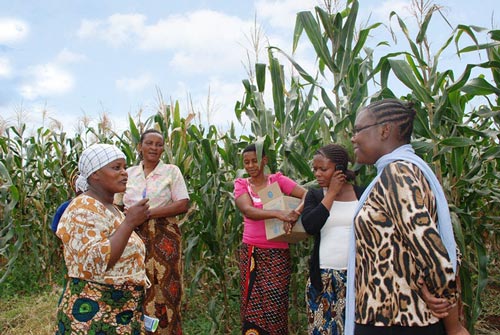
Yield is one of the key things farmers consider when deciding what seed to buy. Farmers in Arusha, Tanzania shared this fact during a field day held by Suba Agro Trading & Engineering Company. The seed company held two field days in June in Arusha and Moshi to give farmers the chance to examine new drought tolerant maize hybrids, TZH536 and TZH538, in the field.
Farmers often get information on what variety to plant based on what they observe doing well in fields in their locale, the advice they receive from other farmers, and the information they receive from the agrovets they buy seed from. About 30 farmers drawn from the Arusha, Kilimanjaro and Moshi districts attended the Moshi field day, as well as local agricultural extension workers and civic leaders from the area. The meeting was held just in front of the field by the roadside, so as the discussions were going on, farmers were able to see the maize being referred to. The maize was labeled and Suba Agro field staff also cut some plants and exposed the cobs for the farmers to see their yield potential.
In Arusha, the field day was held on a Saturday which was market day. Many people popped in to learn about the new maize varieties before returning to the market to buy or sell wares. “Comparing what I see on this [demonstration] field with what is on the neighboring plot, I can see it is drought tolerant,” said Mariamu Hemedi, a local farmer. “We can see that it has not been watered—there is no tap or well here but the maize has thrived. Now we want to know how it is when it is shelled,” Hemedi added. As participants walked through the field examining the cobs, Sarah Muya, an administrator and assistant to the managing director at Suba Agro encouraged them to taste the grains from the green cobs. “It has a good taste,” she said while offering a cob to taste.
Farmers identified the double cobbing in TZH538 as a key feature they liked because it demonstrated they would get higher yields. “When farmers get good yields, it contributes to development as the extra money gained from selling surplus grain contributes to other development initiatives,” said Eliahidi Mvambi, another farmer. W. S. Chonya, the company’s product development manager, told farmers to buy seed early to be prepared for the rain. Muya advised farmers to ensure they buy certified seed and keep receipts of all their seed purchases to enable them trace the source of ‘bad’ seed. “Take up farming as a business,” Muya said, advising farmers to invest in inputs such as improved seed and fertilizer.
Rose E. Moshi, the ward agricultural extension officer, spoke at the event and urged the seed company to ensure the new seed varieties were distributed in the area before the start of the planting season. “Sometimes farmers identify good seed but when they go to the shops, it is unavailable,” Moshi said. She also spoke on the importance of seed purity, citing it as one of the key challenges farmers face. Chonya then explained the features on Suba Agro seed packets to the farmers, highlighting the quality of the paper and the Tanzanian flag at the top of the pack to help farmers identify and avoid counterfeit seed. “Now that you have seen how this seed performs in a farmer’s field, we request you to be our ambassadors in your villages,” Chonya said. The company is in the process of multiplying the seed for these varieties in preparation for the next planting season. The company also participated in agricultural shows in August in Arusha, Mbeya and Morogoro to give more farmers information about its products.
 Capacity development
Capacity development